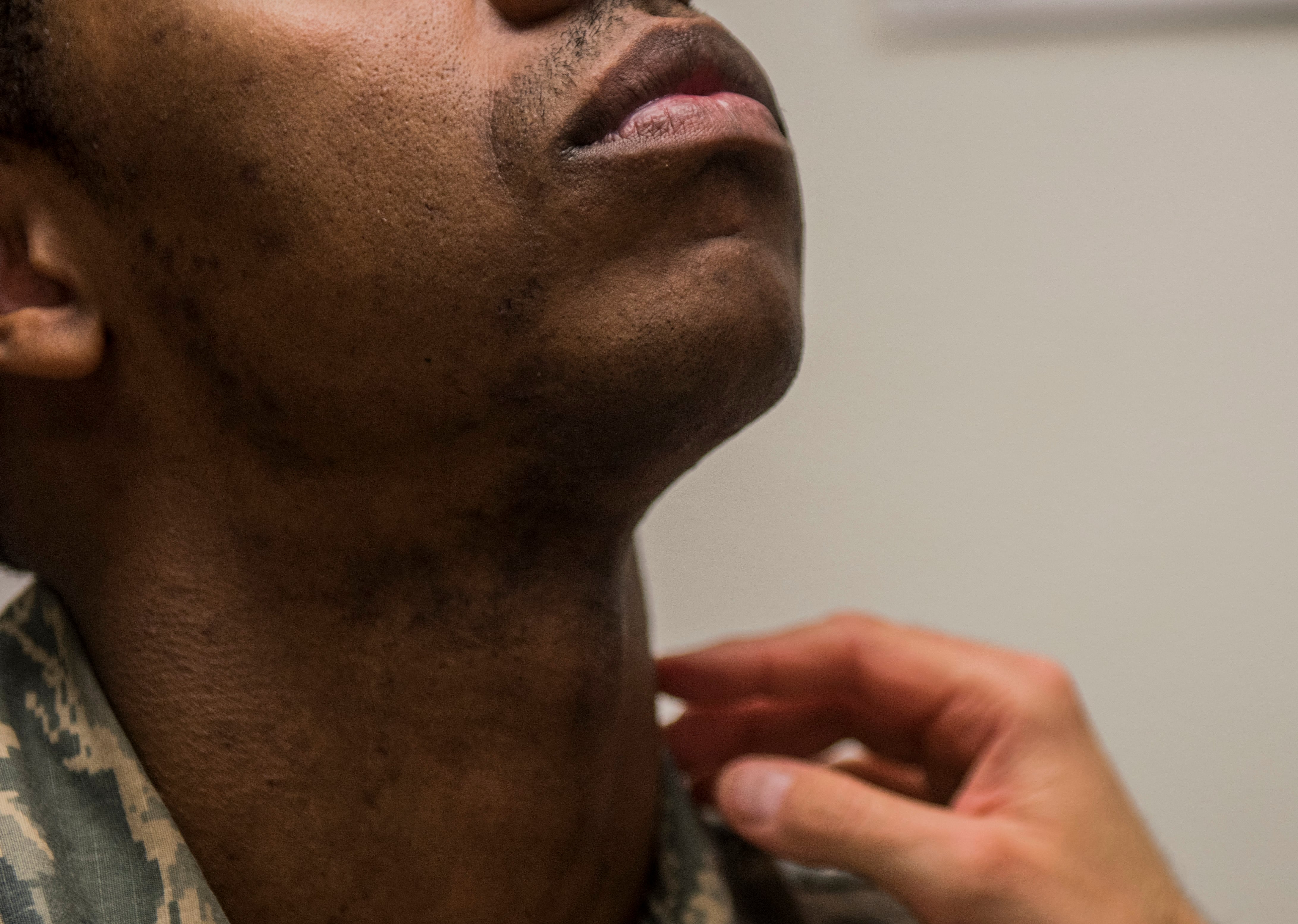As dermatologists on active duty in the United States Air Force, we are appealing to our service’s leaders to re-evaluate the policies prohibiting facial hair growth in male members. Among the authors, it has been widely accepted for years that these regulations do not likely enhance readiness but instead lead to a discriminatory effect against shaving waiver holders that especially affects our Black/African American members.
Black/African American males tend to be on shaving waivers more often than members of other racial/ethnic groups because of a medical condition called pseudofolliculitis barbae (PFB). Different than simple irritation from shaving, PFB results in deep, scar-like painful bumps on the face and/or neck when the facial hair is trimmed too closely. Contrary to the belief of some, PFB is often not manageable with anything other than a shaving profile allowing for just a short amount of hair growth. The notion that these members simply need to learn how to shave the right way is factually incorrect and contradicts what we, as dermatologists, know about this condition.
The concerns previously raised by military dermatologists have been based on countless experiences in the clinic, with airmen telling us about their perceptions of how being on a shaving waiver has affected their time in the USAF. Members are sometimes ostracized from their units, looked down upon by leadership, questioned regarding their integrity, passed up for opportunities, or barred from special duties. We also see airmen who have a clear medical need for a waiver but refuse to take one because they are worried about how it may impact their career. These members endure painful facial outbreaks and scarring — or may even choose to undergo laser hair removal even though they do not actually want to permanently alter their facial hair.
Our renewed call to review these policies is no longer rooted in anecdote alone — an article published in the Journal of Military Medicine in July demonstrated a significant association between shaving waivers and delays in promotion. While this affected members of all races, it disproportionately affected Black/African American members because they were on waivers more often than any other racial group. The study that this association is based on draws on survey data from over 10,000 male active-duty USAF members from installations around the world and represents the best data available on the subject that we know of to date.
We are well aware of the common argument against allowing facial hair: that it precludes the seal of a gas mask, aviator mask, or respirator. To be succinct, the data on this is far from complete. We do not know the minimum length of beard needed to control PFB, and we therefore have not tested that specific length of beard on military specific masks. In our opinion as experienced military dermatologists, one-eighth of an inch of beard length is normally sufficient to control PFB and there is data showing that up to 98 percent of those tested for civilian respirator fit with this length of beard can successfully achieve a seal. Clinical studies to determine the minimum length and then testing that length for mask seal would be easy and very inexpensive to accomplish. If the findings of those studies substantiate the data from the civilian sector, then it could serve as a starting point for possibly implementing changes to our facial hair policies that make sense and that cease the discrimination against our Black/African American members.
We are also aware that there is abuse of shaving profiles, which is often the source of concern from commanders. There are members on them who do not actually need to be, and some members on waivers choose to allow the beard to grow to a length or in a manner that is beyond what is necessary to prevent discomfort. Our suggestion is to not allow beards of any style or length, but rather that through careful research we can craft regulations that allow a narrow range of facial hair options that maintain a professional appearance, promote readiness, and eliminate one source of racial discrimination.
As the world’s premier Air and Space Force we cannot afford to overlook talent within our ranks, and we cannot afford to lose members to separation because of a regulation that may not contribute to readiness. We must continuously re-evaluate policies as new data arises to ensure they remain value added. If they do not, we must be ready to jettison these burdensome regulations no matter how difficult the culture change that goes along with that. In the words of the Chief of Staff of the Air Force, General Charles Q. Brown, we must “accelerate change or lose.” We believe that these proposed changes will help to ensure that we continue to have the most professional, ready, and equitable Air and Space Force in the world that is ready to meet any challenge presented to us.
Lt. Col. Simon Ritchie
Lt. Col. Thomas Beachkofsky
Lt. Col. Casey Bowen
Lt. Col. Emily Wong
Col. Wendi Wohltmann
Lt. Col. Layne Green
Maj. Jane Kerford
Maj. Amanda Leach
Maj. Amanda Derwae
Lt. Col. Simon Ritchie is a dermatologist on active duty in the U.S. Air Force. He leads a small team of other clinicians that recently completed a study published in the Journal of Military Medicine regarding shaving waivers in the USAF and their impact on rates of promotion.
The views expressed are solely those of the authors and do not reflect the official policy or position of the U.S. Government, Department of Defense, or U.S. Air Force.
Editor’s note: This is an Op-Ed and as such, the opinions expressed are those of the author. If you would like to respond, or have an editorial of your own you would like to submit, please contact Military Times senior managing editor Howard Altman, haltman@militarytimes.com.





